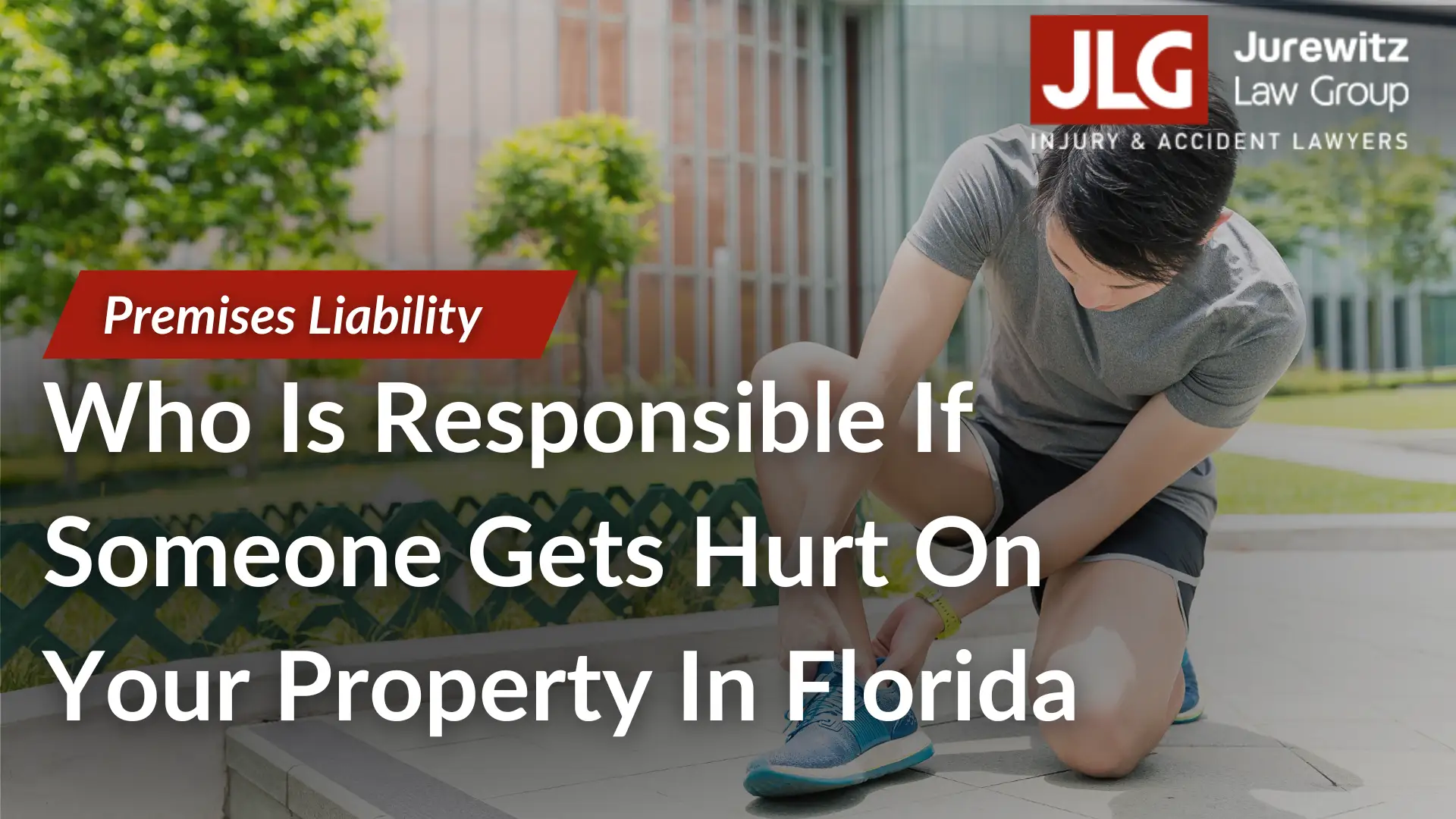
As a property owner in Florida, it’s essential to understand your legal obligations and potential liabilities regarding the safety of visitors. Whether you own a home, a business, or any other type of property, you have a responsibility to maintain a safe environment and to warn visitors of any known hazards. Who is responsible if someone gets hurt on your property?
If someone gets hurt on your property due to a dangerous condition or negligence, you may hold liability for their injuries and damages. However, the extent of your liability can vary depending on several factors. This includes the visitor’s status, the nature of the hazard, and your actions or inactions.
In this blog post, we’ll explore the fundamental principles of premises liability law in Florida, discussing the different categories of visitors, the duties owed by property owners, and the circumstances under which an owner may be held responsible for injuries sustained on their property. By understanding these legal concepts, you can take proactive steps to minimize your liability and ensure the safety of those who enter your premises.
Premises Liability Law in Florida: What You Need to Know
Who is responsible if someone gets hurt on your property? The wording of Florida’s premises liability law may lead some to believe the duty of care for property owners in Florida only applies to commercial property owners. That’s not the case.
Homeowners also have a duty of care to individuals on their properties. This duty involves:
- Regularly checking a person’s property for hazards and unsafe conditions that could harm others
- Promptly remedying any dangerous conditions on a property
- Taking steps to isolate a potentially hazardous condition when eliminating it is impossible or impractical
- Warning guests of hazards and dangerous conditions that might not be immediately obvious
Generally, a homeowner must take reasonable steps to ensure the safety of social guests and others with a right to be on the premises. Homeowners may also have a duty to guard against harm to certain trespassers.
Homeowner Liability for Injuries on Property in Florida
If not the homeowner, as a business, who is responsible if someone gets hurt on your property? Depending on the circumstances, a homeowner may be liable for injuries guests sustain on their property. Consider the example of slip and fall accidents and homeowner liability. Under Florida law, a business may be liable if someone gets hurt in a slip and fall resulting from a “transitory foreign substance” the owner had “actual or constructive knowledge of.” A homeowner or a representative of ownership, like an employee, may be similarly liable.
For example, maybe you hurt yourself in a slip and fall due to a spill at a grocery store. The store may be liable if you show that ownership either knew about the spill and didn’t address it or should have known about it by the time the slip and fall occurred. Similarly, you may need to show a slip and fall at someone’s home resulting from the homeowner’s negligence.
However, proving negligence isn’t always necessary when a guest has been hurt on someone else’s property. For instance, Florida has a strict dog bite liability law. If your dog bites someone on your property (or anywhere else), the law holds you strictly liable, regardless of whether you had prior knowledge of your dog’s potential for viciousness.
Trespasser Injuries Liability in Florida
Who is responsible if someone gets hurt on your property if they are trespassing? Premises liability laws generally apply when someone with a legal right to be on a property sustains injuries. Under Florida law, a property owner may not be liable for injuries to or death of trespassers in any of these circumstances:
- A trespasser had a blood alcohol content (BAC) of at least 0.08 when they were injured.
- A trespasser was injured while under the influence of a chemical substance or controlled substance,
- The effects of any of the substances above impaired a trespasser’s “normal faculties.”
The law doesn’t always shield property owners from liability when trespassers enter their property and are injured. A homeowner may still be liable if a trespasser is hurt on their property due to the homeowner’s “gross negligence or intentional misconduct.”
In addition, a property owner owes certain duties to a “discovered trespasser.” Per the law, a discovered trespasser is a property owner who becomes aware of an incident within 24 hours of the incident, resulting in the trespasser’s injury or death.
A property owner must warn a discovered trespasser about hazards on the property that can cause harm. Specifically, they must warn a discovered trespasser about non-obvious hazards that may not be easily detectable. A homeowner might be liable for injuries to a discovered trespasser if those injuries resulted from a hazard or dangerous condition the homeowner should have warned a trespasser of.
Attractive Nuisance and Child Trespassers in Florida
Who is responsible if someone gets hurt on your property from “attractive nuisances”? Florida law establishes that certain “attractive nuisances” that could harm a child may draw an unsuspecting child to a property where they may be harmed. Per the law, examples of attractive nuisances include abandoned or discarded:
- Iceboxes
- Refrigerators
- Deep-freezers
- Laundry machines
- Other such airtight units
Young children might be tempted to play with these items when they spot them on neighbors’ properties. These attractive nuisances can harm children, particularly if no one has removed their doors. A homeowner may thus be liable for injuries to a child trespasser resulting from an attractive nuisance.
Be aware the law is just one element of Florida’s overall “attractive nuisance doctrine.” For example, cases such as Cockerham v. RE Vaughan, Inc., can also contribute to attractive nuisance common law in Florida.
Insurance Coverage for Accidents on Property in Florida
 Who is responsible if someone gets hurt on your property if you don’t have enough money to pay for damages? Your homeowner’s insurance policy should offer liability coverage. If someone gets hurt on your property, they can file a claim with your insurer to seek compensation for losses. This includes medical bills and lost wages.
Who is responsible if someone gets hurt on your property if you don’t have enough money to pay for damages? Your homeowner’s insurance policy should offer liability coverage. If someone gets hurt on your property, they can file a claim with your insurer to seek compensation for losses. This includes medical bills and lost wages.
An injured party may file a lawsuit as well. They might do so if you don’t have insurance. Or, an injured party may file a lawsuit if your insurance company won’t offer a fair settlement.
They have a limited amount of time to do so. Per Florida’s statute of limitations for civil actions, an injured party typically has two years from the injury date to file a lawsuit. However, there may be exceptions for all legal responsibility. For example, an injured person may have four years to file a lawsuit in a dog bite case.
Contact a Florida Premises Liability Attorney
Don’t know who is responsible if someone gets hurt on your property? Understanding your potential liability as a homeowner in Florida is essential. Understanding your rights is crucial if an accident victim gets hurt on your property.
Have you been harmed at someone’s home due to their actions or carelessness? At Jurewitz Law Group Injury & Accident Lawyers, a Tampa premises liability lawyer could review your personal injury claims and explain potential legal options. Our law firm will help you aggressively pursue the compensation you may deserve if you hire our team of personal injury attorneys. Contact us online or call our firm at (619) 233-5020 for a free case review of your premises liability claim.


